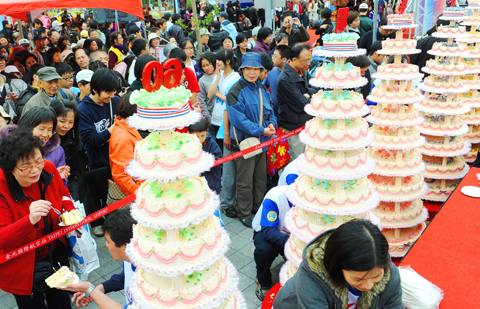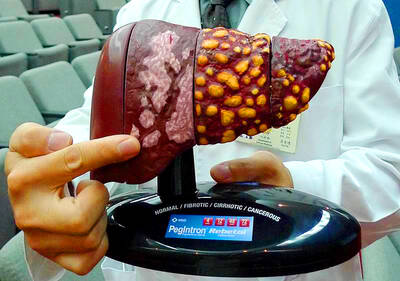Some of Taipei Songshan Airport’s senior employees recalled the history of the nation’s first international airport as it celebrated its 60th anniversary yesterday.
Chang Tsai-hsin (張彩杏), 54, started working at Taipei Songshan Airport in 1971 just after graduating from junior high school. Over the decades, she worked her way up from a part-time employee to secretary to the director of the airport’s office.
Chang’s first job was selling tickets at the entrance to the airport’s waiting room.

PHOTO: CHANG CHIA-MING, TAIPEI TIMES
“If families wanted to accompany passengers to the waiting room, they would have to purchase tickets first. The waiting room had a platform where they could see the aircraft. Tickets for adults cost NT$5 each, and tickets for children cost NT$2,” she said, adding that her monthly salary at the time was NT$1,400.
The Songshan Airport was first used as a Japanese military airport during World War II. In 1936, the airport started providing the direct flight service to Osaka.
Wei Sheng-chih (魏勝之), director of the Taipei Airport office, said that at the time, only officials from the colonial government and privileged citizens could take flights.
Air China, which was then owned by the Chinese Nationalist Government, provided flights from Songshan to Shanghai as well as to Fuzhou between 1946 and 1949, said Wei, adding that the Civil Aeronautics Administration later began operations in Taiwan on April 16, 1950 and launched flights from Taipei to Hong Kong.
TransAsia Airways (復興航空) was established in 1951 and offered domestic flights from Taipei to Hualien and Kaohsiung. By 1978, the airport offered 188 international and domestic flights a week, with more than 17,000 passengers a day.
Songshan was both an international and domestic airport until 1979, when the government decided to move international flights to the Taoyuan International Airport. Songshan continued as a domestic airport, resuming its function an international airport when cross-strait flight service was launched in 2008.
As a gift for the Songshan Airport’s 60th anniversary, Chang dedicated her painting of Alishan (阿里山) to the airport.
“I had the idea of painting Alishan when the government allowed Chinese tourists to come and visit Taiwan,” Chang said.
“I wanted to introduce the nation’s most beautiful scenery to the Chinese tourists — the cherry blossoms and the Forest Railway in Alishan,” she said.
Chang said it took her about a month to finish the painting, which was about 1.78m in length and 0.95m in width.
Wang Mei-chi (王梅芝) and Liu Mei-ping (劉美萍) have also been working at the airport for nearly 40 years. Wang’s first job at the airport was in the airport’s elevator, while Liu served as a phone operator.
Wang said she worked at the airport during the day and went to school at night. Unlike the nicely dressed elevator ladies that one see in department stores today, Wang said she simply wore her student uniform to work.
Working as an operator, Liu recalled that the operator service had to be available 24 hours a day back then.
To mark the airport’s 60th anniversary, the Taipei Airport Office yesterday hosted a variety of celebrations at the plaza in front of the Airport’s terminal.

The Taipei Summer Festival is to begin tomorrow at Dadaocheng Wharf (大稻埕), featuring four themed firework shows and five live music performances throughout the month, the Taipei Department of Information and Tourism said today. The festival in the city’s Datong District (大同) is to run until Aug. 30, holding firework displays on Wednesdays and the final Saturday of the event. The first show is scheduled for tomorrow, followed by Aug. 13, 20 and 30. To celebrate the 30th anniversary of Disney Pixar's movie Toy Story, the festival has partnered with Walt Disney Co (Taiwan) to host a special themed area on

Aftershocks from a magnitude 6.2 earthquake that struck off Yilan County at 3:45pm yesterday could reach a magnitude of 5 to 5.5, the Central Weather Administration (CWA) said. Seismological Center technical officer Chiu Chun-ta (邱俊達) told a news conference that the epicenter of the temblor was more than 100km from Taiwan. Although predicted to measure between magnitude 5 and 5.5, the aftershocks would reach an intensity of 1 on Taiwan’s 7-tier scale, which gauges the actual effect of an earthquake, he said. The earthquake lasted longer in Taipei because the city is in a basin, he said. The quake’s epicenter was about 128.9km east-southeast

BE CAREFUL: The virus rarely causes severe illness or death, but newborns, older people and those with medical conditions are at risk of more severe illness As more than 7,000 cases of chikungunya fever have been reported in China’s Guangdong Province this year, including 2,892 new cases last week, the Centers for Disease Control (CDC) yesterday said it is monitoring the situation and considering raising the travel notice level, which might be announced today. The CDC issued a level 1 travel notice, or “watch,” for Guangdong Province on July 22, citing an outbreak in Foshan, a manufacturing hub in the south of the province, that was reported early last month. Between July 27 and Saturday, the province reported 2,892 new cases of chikungunya, reaching a total of 7,716

STAY VIGILANT: People should reduce the risk of chronic liver inflammation by avoiding excessive alcohol consumption, smoking and eating pickled foods, the physician said A doctor last week urged people to look for five key warning signs of acute liver failure after popular producer-turned-entertainer Shen Yu-lin (沈玉琳) was reportedly admitted to an intensive care unit for fulminant hepatitis. Fulminant hepatitis is the rapid and massive death of liver cells, impairing the organ’s detoxification, metabolic, protein synthesis and bile production functions, which if left untreated has a mortality rate as high as 80 percent, according to the Web site of Advancing Clinical Treatment of Liver Disease, an international organization focused on liver disease prevention and treatment. People with hepatitis B or C are at higher risk of